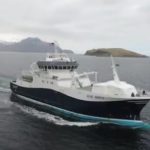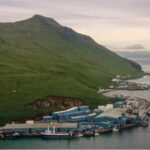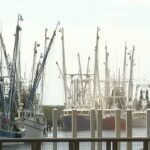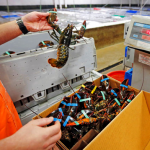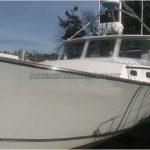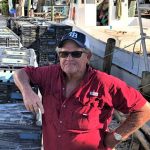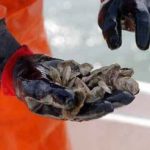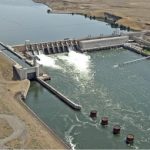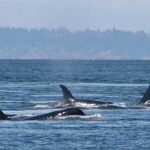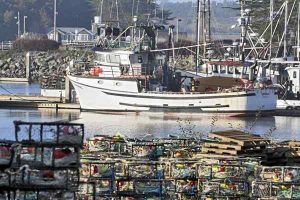Tag Archives: offshore aquaculture
NOAA Is Rolling Out a Plan to Radically Expand Offshore Aquaculture. Not Everyone Is Onboard
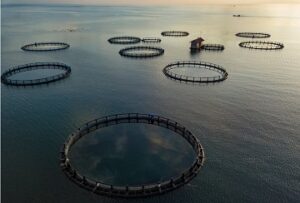 The cardboard gravestones read “RIP Local fisherman,” “RIP Wild Fish,” and “RIP Humpback Whales.” Assembled in response to new aquaculture sites planned off the coast of California, the gravestones were brought to the offices of the National Oceanic and Atmospheric Administration (NOAA) in Long Beach, California, in April by activists keen to register their discontent. The sites pave the way for possibly dozens of new open-pen fish farms as far as three miles offshore, the future home of species that range from carp to salmon. Chief among the protesters’ concerns were entanglement of marine mammals, the expansion of dead zones caused by fish excrement, and infringement on wild fishing grounds. >click to read< 09:07
The cardboard gravestones read “RIP Local fisherman,” “RIP Wild Fish,” and “RIP Humpback Whales.” Assembled in response to new aquaculture sites planned off the coast of California, the gravestones were brought to the offices of the National Oceanic and Atmospheric Administration (NOAA) in Long Beach, California, in April by activists keen to register their discontent. The sites pave the way for possibly dozens of new open-pen fish farms as far as three miles offshore, the future home of species that range from carp to salmon. Chief among the protesters’ concerns were entanglement of marine mammals, the expansion of dead zones caused by fish excrement, and infringement on wild fishing grounds. >click to read< 09:07
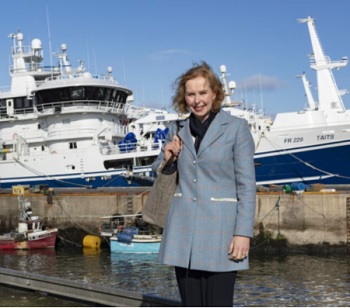
Fishing chief says wind projects bring ‘new challenges’ for Scottish fleet
The fishing industry has a key role to play in the energy transition amid a “spatial squeeze” in Scottish waters. That was the message from Elspeth Macdonald, chief executive of the Scottish Fishermen’s Federation,,, Ms Macdonald said fishers faced competition for territory from a range of other sectors, including aquaculture, oil and gas, and marine renewables. Marine protected areas are also a limiting factor on fishing opportunities, she added. And sea space is about to be “squeezed” even more by a raft of offshore wind energy developments as Scotland pursues its net-zero carbon emissions targets,,, >click to read< 11:36
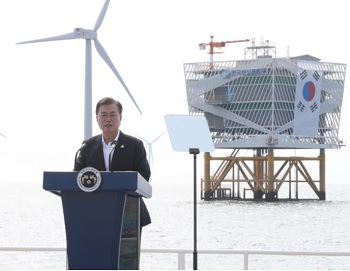
Ocean Industrialization: Can offshore wind farms coexist with fish farms?
South Korea will launch a pilot project to combine an offshore wind farm with aquaculture, as it pushes to tap the unlimited potential of water, which surrounds the country on three sides, as a future source of energy. The project, set to kick off in the second half of this year, involves a 60-megawatt wind turbine foundation installed in waters off Buan, North Jeolla Province, integrated with artificial reefs and aquaculture systems. The trial-run will last until Dec. 31, 2022. >click to read< 09:05
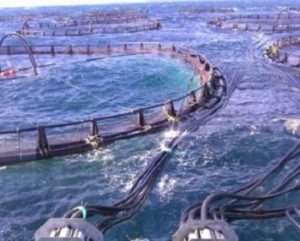
Senators Introduce Legislation to Establish Offshore Aquaculture Standards
Senators Wicker-R, Schatz -D and Rubio -R introduced legislation, the Advancing the Quality and Understanding of American Aquaculture (AQUAA) Act (S. 4723) in the U.S. Senate. The bipartisan AQUAA Act, which has companion legislation in the U.S. House, would support development of an offshore aquaculture industry in the U.S. to increase the production of sustainable seafood and establish new economic opportunities in federal waters. >click to read< 13:43
 First Nations, commercial fishermen demands end to B.C. salmon farms – A broad coalition of First Nations leaders, wilderness tourism operators, environmental NGOs and commercial and sport fishing organizations gathered in North Vancouver Sept. 22 demanding the federal government fulfill recommendations of the Cohen Commission to immediately remove open-net salmon farms from the Discovery Islands, and abolish all others from BC waters by 2025. >click to read<
First Nations, commercial fishermen demands end to B.C. salmon farms – A broad coalition of First Nations leaders, wilderness tourism operators, environmental NGOs and commercial and sport fishing organizations gathered in North Vancouver Sept. 22 demanding the federal government fulfill recommendations of the Cohen Commission to immediately remove open-net salmon farms from the Discovery Islands, and abolish all others from BC waters by 2025. >click to read<
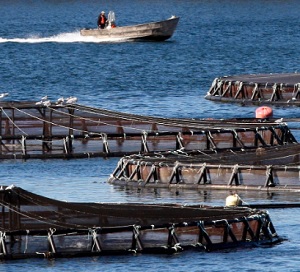
Opposition grows to expanding fin fish farming
The Trump administration and the aquaculture industry said the order, which is being implemented now, represents common sense steps to ease the burden of rules on fish farmers. “They’re trying to somehow connect open-water aquaculture with the need for domestic food. But it just doesn’t make sense,” said Marianne Cufone, executive director of the Recirculating Farms Coalition,,, Some fishing groups have also come out in support of the order. Scot Mackey, director of government affairs for the Garden State Seafood Association, which advocates for fishermen as well as farmers, said the order “will help the industry weather the current crisis and come back stronger.” Neville Crabbe, spokesman for the Atlantic Salmon Federation, a conservation group, said the federal permitting process should be creating land-based aquaculture rather than fish farms in the ocean, let alone offshore. >click to read< 18:13
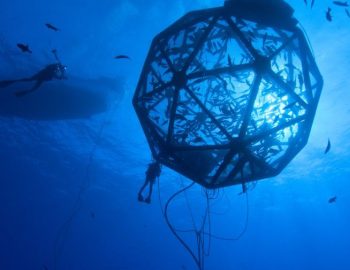
Feds select Gulf of Mexico Southern, California as potential zones for fish farming in the EEZ
The gulf joins Southern California in becoming a region for “Aquaculture Opportunity Areas,” the first two in the United States. President Donald Trump issued an executive order earlier this year outlining the concept as a way of boosting the country’s seafood industry and reducing its reliance on imported fish. The selection covers federal waters but does not identify more specific locations. “The creation of Aquaculture Opportunity Areas will foster the U.S. aquaculture industry as a needed complement to our wild capture fisheries,” said Chris Oliver, the assistant administrator for NOAA Fisheries, in a statement. >click to read< 14:14
 Commissioner Fried Welcomes NOAA Announcement – The announcement comes after Florida Agriculture Commissioner Nikki Fried sent a letter to the U.S. Commerce Secretary Wilbur Ross, asking that the department consider designating waters off Florida’s coast as an Aquaculture Opportunity Area. Echoing Commissioner Fried’s call were U.S. Senators Marco Rubio and Rick Scott, the National Aquaculture Association, the Florida Aquaculture Ass,,, >click to read<
Commissioner Fried Welcomes NOAA Announcement – The announcement comes after Florida Agriculture Commissioner Nikki Fried sent a letter to the U.S. Commerce Secretary Wilbur Ross, asking that the department consider designating waters off Florida’s coast as an Aquaculture Opportunity Area. Echoing Commissioner Fried’s call were U.S. Senators Marco Rubio and Rick Scott, the National Aquaculture Association, the Florida Aquaculture Ass,,, >click to read<
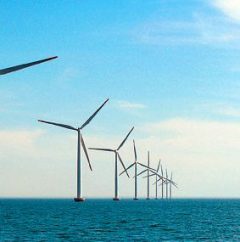
Displacement of fishermen? Offshore Wind Could Have Major Adverse Impact on Commercial Fisheries
The Bureau of Ocean Energy Management’s (BOEM) draft supplemental environmental review for Vineyard Wind off the coast of Martha’s Vineyard in Massachusetts indicates that offshore wind farms could have a major “adverse” impact on commercial fisheries.,, The study also notes concern that offshore wind turbines and transmission cables could entangle with fishing vessels and gear, and that wind farms could result in the temporary or permanent displacement of fishermen in certain areas. >click to read< 13:02
N E looks to Europe to assess environmental impacts of offshore energy facilities – “In the next 20 years there will be more than 2,000 wind turbines off the coastline,” “We think there’s lots of potential for environmental benefit of putting offshore aquaculture together with offshore renewable — from an environmental point of view, but also from an economic point of view,” she said. “Sharing space is going to be the only way I think we can move forward in this industry,,, >click to read<

Future of offshore fish farming in federal waters at issue in court
The potential environmental and economic consequences posed by proposals for fish farming in federal waters dictate that Congress — not a federal agency — must decide how to regulate the industry, an attorney told a federal appeals court Monday. At issue before the 5th U.S. Circuit Court of Appeals was a September 2018 ruling by a federal judge who threw out National Oceanic and Atmospheric Administration’s rules for fish farms in the Gulf of Mexico, saying Congress never gave the agency authority to make them. >click to read< 14:58
Meet Chris Schillaci who Joins Greater Atlantic Region’s Aquaculture Program! – In December, Chris Schillaci joined the Greater Atlantic Region’s aquaculture program, bringing ten years of experience to his new role. We asked Chris a few questions as he was settling in. >Click to read<
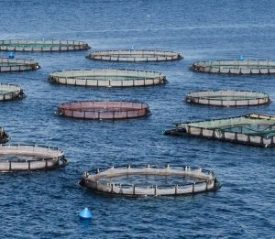
Victory! Court Shuts Down Offshore Aquaculture in Gulf of Mexico
Today, Center for Food Safety, representing a coalition of fishing and public interest groups, won their lawsuit challenging the Department of Commerce’s new federal rules that would have permitted, for the first time, industrial aquaculture offshore in U.S. federal waters. “This is a landmark victory for protecting our oceans, for fishing communities and conservationists,” said George Kimbrell, CFS Legal Director and lead counsel in the case. “Allowing industrial net-pen aquaculture and its known environmental harms in the Gulf of Mexico is a grave threat. Very simply, as the Court properly held, aquaculture is not ‘fishing.’ These types of harms cannot be allowed under existing fisheries law never intended for that purpose.” >click to read<18:51
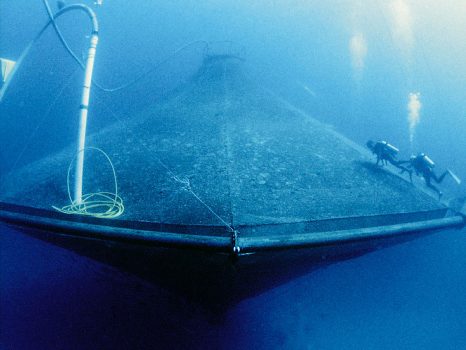
Offshore Aquaculture: Groups divided over Gulf fish farming
While proponents of aquaculture support expanding fish and shellfish farming in the Gulf of Mexico, local fishermen and food safety groups are wary of the consequences. “Developing offshore aquaculture in the Gulf of Mexico will benefit everyone. Consumers will get additional access to sustainable domestically grown seafood,” said Jim Gossen, president of the Gulf Seafood Foundation. “Using the latest proven management practices, this should provide more wild fish to both the recreational and commercial fisheries.” In 2016, NOAA filed a final rule implementing the nation’s first comprehensive regulatory program for aquaculture in federal waters. The rule allowed for the establishment of a regional permitting process to manage the development of an environmentally sound and economically sustainable aquaculture industry in the Gulf. However, local and national groups oppose the current plan in its entirety or how it’s being implemented. click here to read the story 08:56
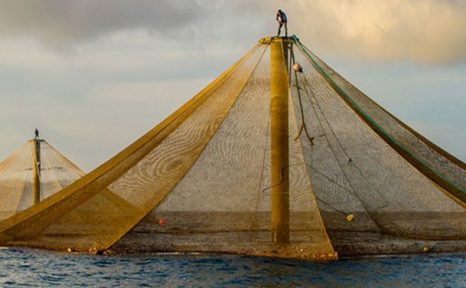
Is the United States ready for offshore aquaculture?
Harlon Pearce walks muck-booted past processors gutting wild drum and red snapper to showcase a half-full new 5,000-square-foot (500-square-meter) freezer he hopes will someday house a fresh boom of marine fish. Harlon’s LA Fish sits just across the railroad tracks from the Louis Armstrong New Orleans International Airport, perfectly positioned to ship fish out of Louisiana. As president of the New Orleans–based Gulf Seafood Institute, seafood supplier Pearce is a big fish himself in these parts, connected to fishermen, federal agencies, restaurateurs and even the oil industry. He knows better than anyone that wild fisheries alone can’t supply U.S. consumers’ growing demand for fish. Which is why he’s doing his best to bring everyone to the table to achieve one goal: farming the Gulf of Mexico. click here to read the story 16:31
Center for Food Safety lawsuit challenge’s NOAA’s push for aquaculture in offshore U.S. waters
 Center for Food Safety has filed a new lawsuit challenging the National Oceanic and Atmospheric Administration’s (NOAA) new federal regulations permitting, for the first time, industrial aquaculture offshore in U.S. federal waters in the Gulf of Mexico. The plaintiff coalition CFS is representing in the case make up a broad array of significant interests in the Gulf of Mexico, including commercial, economic, recreational, and conservation groups. Read the rest here 09:09
Center for Food Safety has filed a new lawsuit challenging the National Oceanic and Atmospheric Administration’s (NOAA) new federal regulations permitting, for the first time, industrial aquaculture offshore in U.S. federal waters in the Gulf of Mexico. The plaintiff coalition CFS is representing in the case make up a broad array of significant interests in the Gulf of Mexico, including commercial, economic, recreational, and conservation groups. Read the rest here 09:09
The Many Problems With the Proposed Fish Farm in San Diego
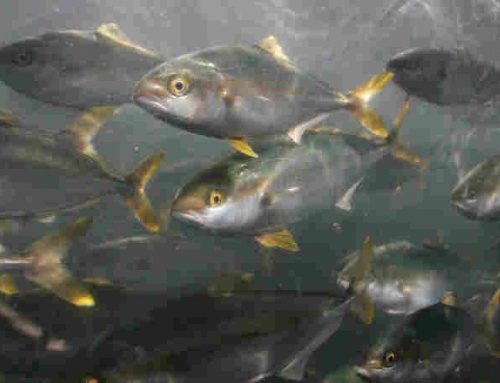 If you’ve ever driven north on Interstate 5 and passed through the section with industrial feedlots for cattle, you know the smell. It’s unforgettable. Besides the obvious odor, though, there are serious environmental, animal welfare and human health issues associated with these large-scale meat production facilities. Those issues are similar to environmental concerns about offshore aquaculture – or factory fish farms in the ocean. In Ry Rivard’s Jan. 19 story, “State Probing Experimental Hubbs Fish Breeding Program That’s Spawned Deformities, Mixed Results,” he called attention to the prevalence of disease and deformity in hatchery-raised white seabass in a smaller project run by Hubbs-SeaWorld Research Institute in Agua Hedionda Lagoon. Read the rest here 22:57
If you’ve ever driven north on Interstate 5 and passed through the section with industrial feedlots for cattle, you know the smell. It’s unforgettable. Besides the obvious odor, though, there are serious environmental, animal welfare and human health issues associated with these large-scale meat production facilities. Those issues are similar to environmental concerns about offshore aquaculture – or factory fish farms in the ocean. In Ry Rivard’s Jan. 19 story, “State Probing Experimental Hubbs Fish Breeding Program That’s Spawned Deformities, Mixed Results,” he called attention to the prevalence of disease and deformity in hatchery-raised white seabass in a smaller project run by Hubbs-SeaWorld Research Institute in Agua Hedionda Lagoon. Read the rest here 22:57
Projects Stall After Feds Allow Fish Farming in Open Ocean
 Some 90 percent of seafood consumed by Americans is imported — a fact that the Obama administration vowed to start turning around by expanding fish and shellfish farms into federal waters. Yet nearly two years since the first permit was issued, the United States still has no offshore farms. The pioneers of offshore aquaculture say their plans have stalled or been abandoned because of the long and expensive federal permitting process that requires extensive environmental monitoring and data collection. Read the article here 07:36
Some 90 percent of seafood consumed by Americans is imported — a fact that the Obama administration vowed to start turning around by expanding fish and shellfish farms into federal waters. Yet nearly two years since the first permit was issued, the United States still has no offshore farms. The pioneers of offshore aquaculture say their plans have stalled or been abandoned because of the long and expensive federal permitting process that requires extensive environmental monitoring and data collection. Read the article here 07:36

































